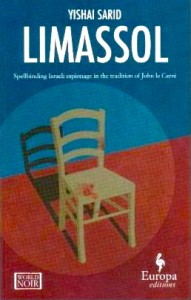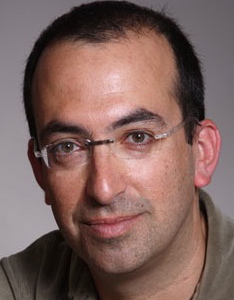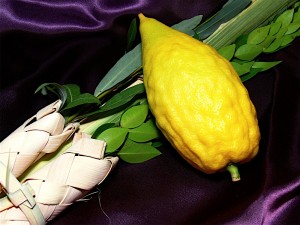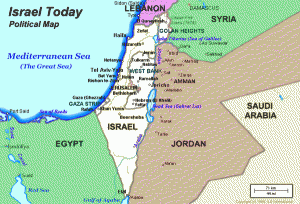Note: This novel was WINNER of the Grand Prix de Litterature Policiere 2011, for Best Foreign Crime Novel of the year in France.
“Before you go splashing paint, making a gigantic picture of Hannibal’s battles, you need to know how to draw a horse.”
In  this novel by Israeli author Yishai Sarid, an unnamed speaker is clearly “drawing the horse” of Israeli society and establishing the setting in which the animosity between Arabs and Jews has festered, then exploded into a series of continuous battles. Working undercover for the Israeli secret service, the speaker approaches Daphna, an Israeli woman who has written a book and now teaches writing. The speaker has written a story about a Jewish trader who travels to an island in Greece to buy etrogs, citrons used during the weeklong Jewish holiday of Sukkot, and then bring them back to Israel for sale. He says he wants to learn more about writing so that he can develop this story of the etrog trade further. In reality, etrogs are also grown in Israel, and his story about a dealer going to Greece to buy them is not very realistic, but his primary purpose is not learning to write or develop a short story. He is far more interested in befriending Daphna, whose long-time friendship with Hani, a seriously ill “man from Gaza,” might lead him to Hani’s son Yotam, regarded as an Arab terrorist and hiding from security, perhaps in another country.
this novel by Israeli author Yishai Sarid, an unnamed speaker is clearly “drawing the horse” of Israeli society and establishing the setting in which the animosity between Arabs and Jews has festered, then exploded into a series of continuous battles. Working undercover for the Israeli secret service, the speaker approaches Daphna, an Israeli woman who has written a book and now teaches writing. The speaker has written a story about a Jewish trader who travels to an island in Greece to buy etrogs, citrons used during the weeklong Jewish holiday of Sukkot, and then bring them back to Israel for sale. He says he wants to learn more about writing so that he can develop this story of the etrog trade further. In reality, etrogs are also grown in Israel, and his story about a dealer going to Greece to buy them is not very realistic, but his primary purpose is not learning to write or develop a short story. He is far more interested in befriending Daphna, whose long-time friendship with Hani, a seriously ill “man from Gaza,” might lead him to Hani’s son Yotam, regarded as an Arab terrorist and hiding from security, perhaps in another country.

The speaker has been totally committed to his job in the secret service, to the extent that it has dramatically affected his relationship with his wife Sigi and son, whom he allows to fend for themselves much of the time while he interrogates suspects, often using force–the ends of avoiding a terrorist attack seeming to justify the means, in the speaker’s mind. Gradually, the many forms of security, including active surveillance, interrogations, threats, the making of promises in exchange for information, and even physical brutality show the fear within the Israeli society, even at the highest levels, and the determination to do whatever is necessary to protect the country. As the speaker’s boss says, “With the Arabs we don’t have a problem…We’re so angry at them we don’t have any trouble being brutal.”
Gradually, the novel becomes more “domestic.” The speaker’s wife Sigi, tired of being ignored in favor of his job, gets a transfer of her job to Boston, and she begs the speaker to come with her and their son. Daphna wants the speaker to help her Arab friend Hani get treatment in Israel for the pancreatic cancer that is rapidly consuming his life. She also needs help for her son, involved with drugs and owing a huge sum of money to someone who financed a movie that the son never made. By contrast, Hani’s son, trained as a terrorist, has a sense of mission, a commitment that gives purpose to his life. The speaker’s little son, who may be going to Boston with his mother, may soon drop from his life, a sad little coda to the story of a devoted security man.

These domestic issues put the security situation into a larger perspective, showing the effects that the lack of peace has on all levels of society, both in Israel and in Gaza. As the speaker’s advisor comments, “We are two tribes of gorillas hitting one another. Like Kubrick’s 2001: A Space Odyssey, only our sticks are more advanced.” As the speaker succumbs to the pressures of his job, the toll that Israel’s fraught relationship with its neighbors takes on the society becomes more and more clear. Enemies have become inhuman ciphers, and little attention is paid to their common humanity and the understandable goals each has for the same land. Eventually, the speaker must decide whether to allow his humanity to become more important than his lock-step adherence to the age-old belief in the inherent enmity of all “others.” In the process the reader comes to understand the agonizing tension between these two traditional foes and hope that at some point it will be possible for reason to become part of the equation of their lives.

Author Sarid, an attorney who studied at Hebrew University in Jerusalem and who contributes to the Hebrew press, raises and discusses through his fiction important issues affecting all sides in the Israeli-Arab conflict, providing the reader with many new insights. His clear prose and realistic vision of some of the issues common to all humans, yet dividing these foes, make this a novel from which readers will gain new perspectives and new understandings.
Photos, in order: The author’s photo by Dan Porges appears on http://www.ithl.org.il/authors.html
An etrog is a citron used in Sukkot holidays:
http://www.mkhc.org/
Limassol, the title of the book, is the second largest city on the island of Cyprus in the Mediterranean, northwest of Lebanon. An important meeting involving the speaker is scheduled to take place there. See map of Israel and surrounding areas, including Gaza, which appears on http://www.historicjesus.com/maps/israel.html
